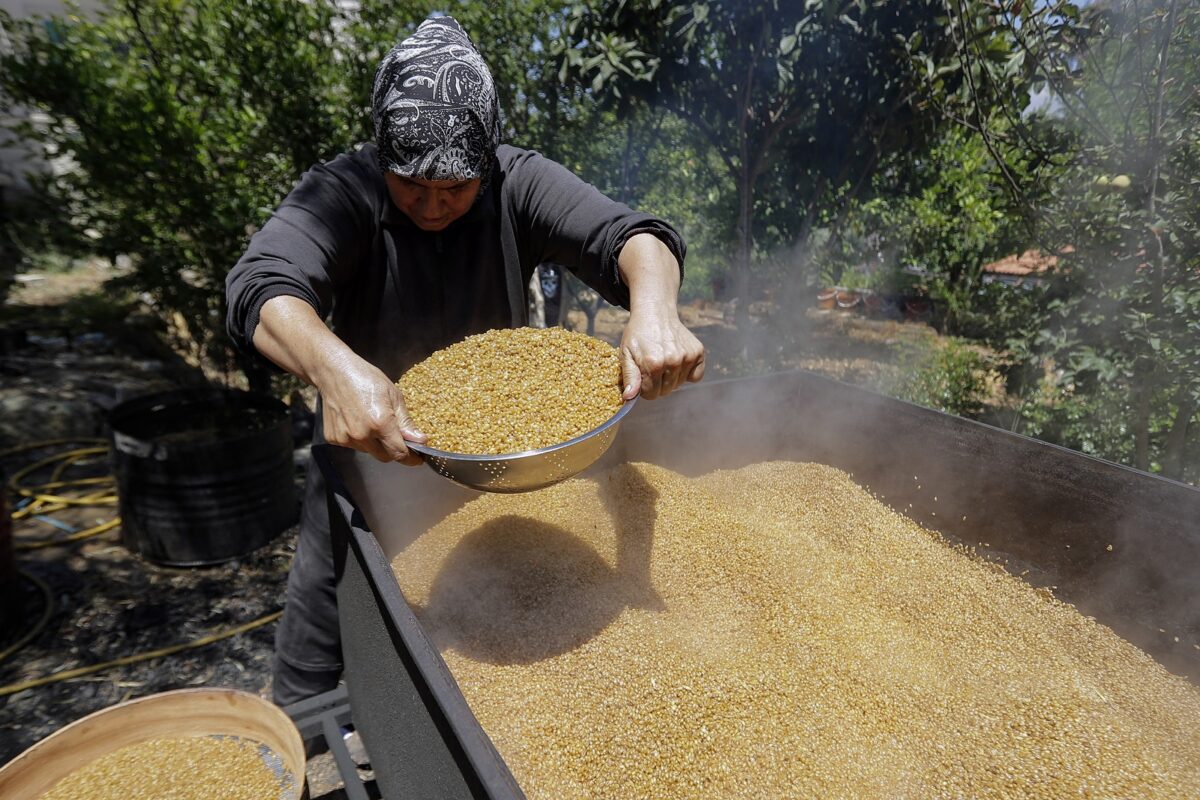
Lebanese mouneh, a traditional practice of preserving and storing food, has long been a cultural staple in Lebanon. In the current context of war and economic instability, it has taken on an even more significant role as a symbol of resilience and self-sufficiency. Preserving foods for the winter using seasonal herbs, vegetables, plants, and animal products remains a significant tradition among rural communities in the Levant.
In Lebanon, the practice has experienced a resurgence, particularly following the 2019 economic crisis. Culinary experts and merchants observe that the crisis has brought Mouneh into the spotlight, highlighting its financial and health benefits and reviving a tradition that had long been underappreciated.
Lebanese Mouneh is more than just a method of food preservation; it has become a symbol of resilience, embodying the Lebanese people’s ability to adapt, survive, and maintain their cultural identity in the face of adversity.
A culinary teacher and owner of a catering business in the area of Hasbaya South Lebanon, Walid Khattar told NOW: “Lebanese Mouneh is more than just a method of food preservation; it has become a symbol of resilience, embodying the Lebanese people’s ability to adapt, survive, and maintain their cultural identity in the face of adversity.”
Some have turned Mouneh making into small businesses, producing high-quality, artisanal products that cater to both local and expatriate communities. This entrepreneurial approach helps sustain families financially during the economic downturn.
Continuity Amid Disruption:
The process of making Mouneh typically involves communal efforts, with families and neighbors gathering to prepare and share resources. However, this year in the South, communities have been deprived of this tradition.
In South Lebanon, Mouneh is not just a practical activity but also a cultural one, passed down through generations. The act of making Mouneh is a way of preserving not only food but also cultural heritage, which can be a source of strength and identity in times of crisis.
The practice of Mouneh is a way for people to maintain a sense of normalcy and continuity, even as their lives are disrupted by war.
Empowering women:
Traditionally, women have been responsible for Mouneh-making. In a war context, this role takes on greater significance as it empowers women to contribute directly to the survival and well-being of their families. It also fosters a sense of purpose amid the uncertainties of war.
For Em Hassan, the displacement of war has not limited her to sit at home and do nothing. Instead she is preparing her Mouneh for her own household and her loyal customers in her sisters home in Baalbeck where she is currently taking refugee as her village Khiam is under bombing from the Israeli military attacks.
“Makinhg Mouneh even in displacement is a reminder that we carry with us the skills, traditions and love for this practice that is part of our heritage from one generation to another.”
According to Em Hassan, the gratitude and support from her customers is what encourages her to continue with dedication.
For generations, Mouneh has been a source of sustenance and pride for the women of South Lebanon.
“It’s how we’ve weathered the storms of life, from harsh winters to the long months of conflict. Now, it is also how I support my family.” Explained Fatema Badreddine, a mother of 4 who is from Jbaa, South Lebanon.
“The war has made everything harder. The sounds of explosions and the fear of the unknown are constant companions, but in the midst of this chaos, we have to hold on to the rituals of Mouneh-making,” added Fatema.
For these women, selling Mouneh is not just a business for them, it is a connection to their roots and a way to share the flavors of their land with others. Every sale for them is a small victory, especially amid the ongoing war as it is a reminder that despite everything, they are still putting the effort in to live, work and love the land that sustain them for so long.
Part of the Lebanese regions
Mouneh was originally developed as a way to extend the shelf life of food and, more importantly, to ensure a supply of food during the seasons when nature is less abundant.
The climate and soil of southern Lebanon provide perfect conditions for growing and producing thyme, bulgur (crushed wheat), and freekeh (green durum wheat).
In the southeastern cities of Hasbaya and Rashaya, the emphasis is on fruit-based products, particularly jams, fruit roll-ups, and their famous grape molasses.
“Despite living in a country abundant with natural beauty and resources, we have relied heavily on imports for most of our lives. This cannot continue. We need to be productive and realize that by utilizing Lebanon’s own resources, we can address our financial issues without relying on foreign aid,” said Hatem Mhanna, a local farmer from Rashaya.
Land damage: Less production
The damage to land in South Lebanon caused by Israeli attacks has a profound impact on the making and production of Mouneh. Mouneh, the traditional preservation of foodstuffs, relies heavily on the quality and availability of local agricultural produce.
The war disrupts the regular cycles of planting, tending, and harvesting crops. Without a predictable harvest, it becomes challenging to plan for and produce Mouneh, which traditionally occurs during specific times of the year when produce is abundant.
The use of munitions and explosives has led to soil contamination. In some areas, unexploded ordnance and remnants of war pose a significant risk, not only to the safety of farmers working the land but also to the quality of the soil and water sources.
Rodayna Raydan is a Lebanese-British journalist. You can follow her on Twitter @Rodayna_462
The views in this story reflect those of the author alone and do not necessarily reflect the beliefs of NOW.








